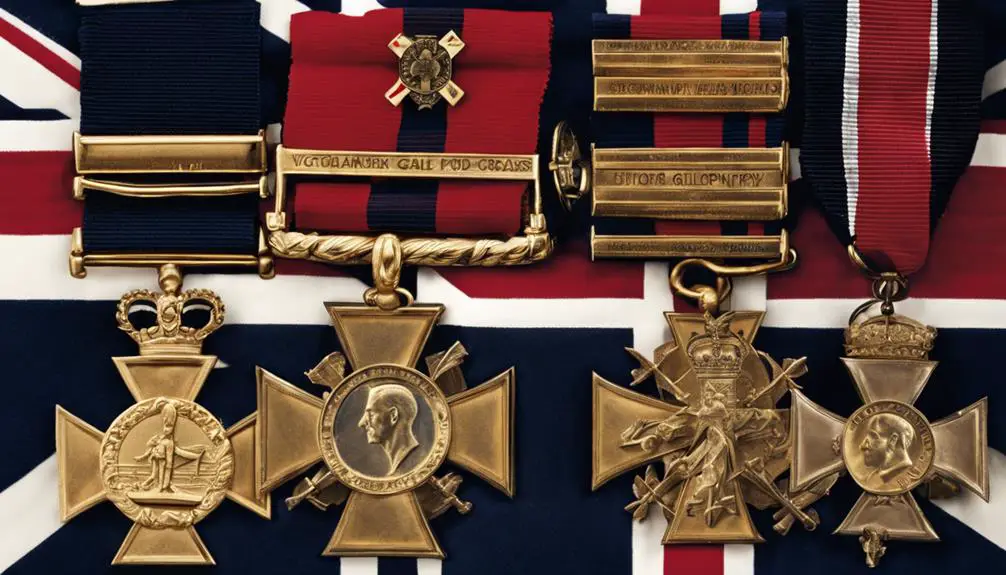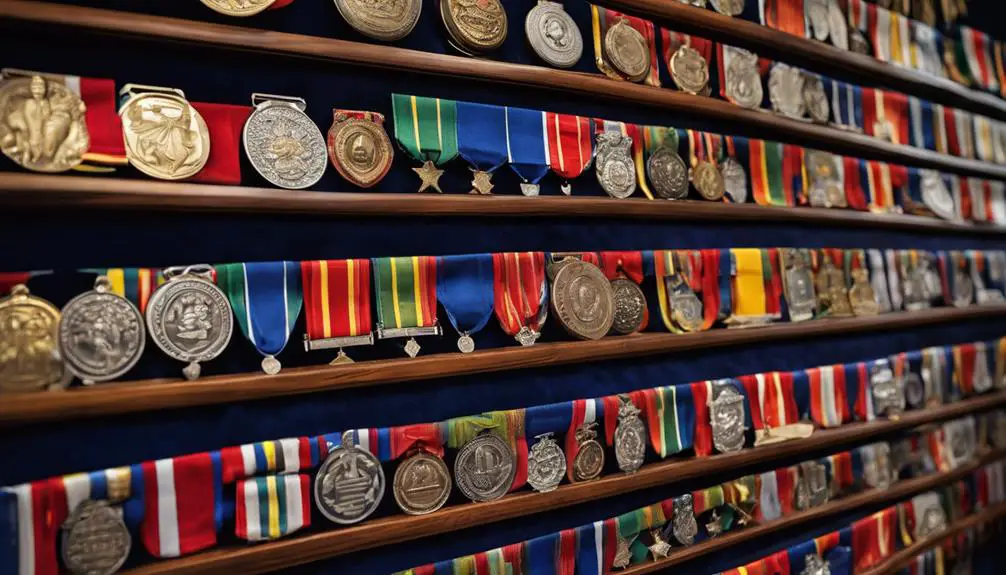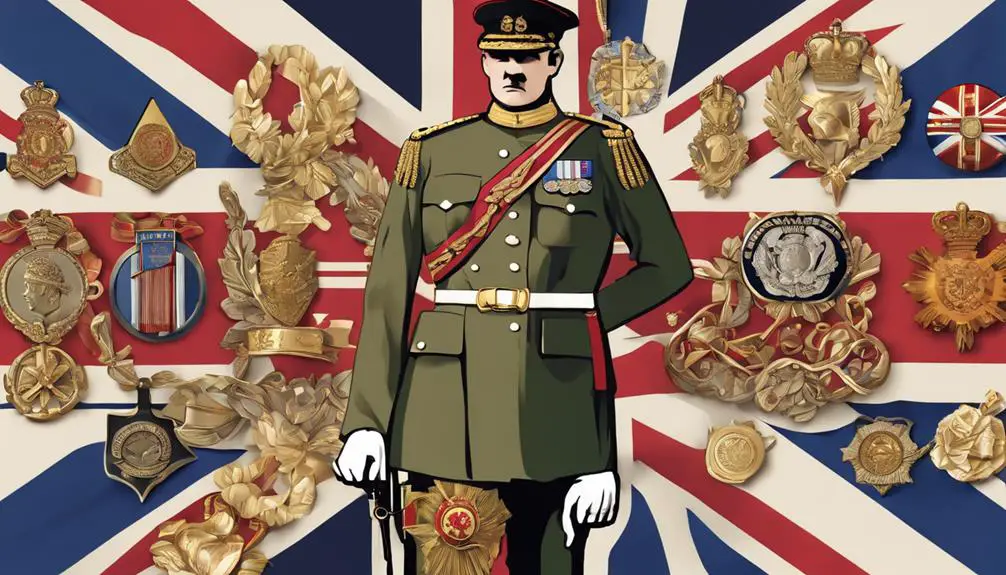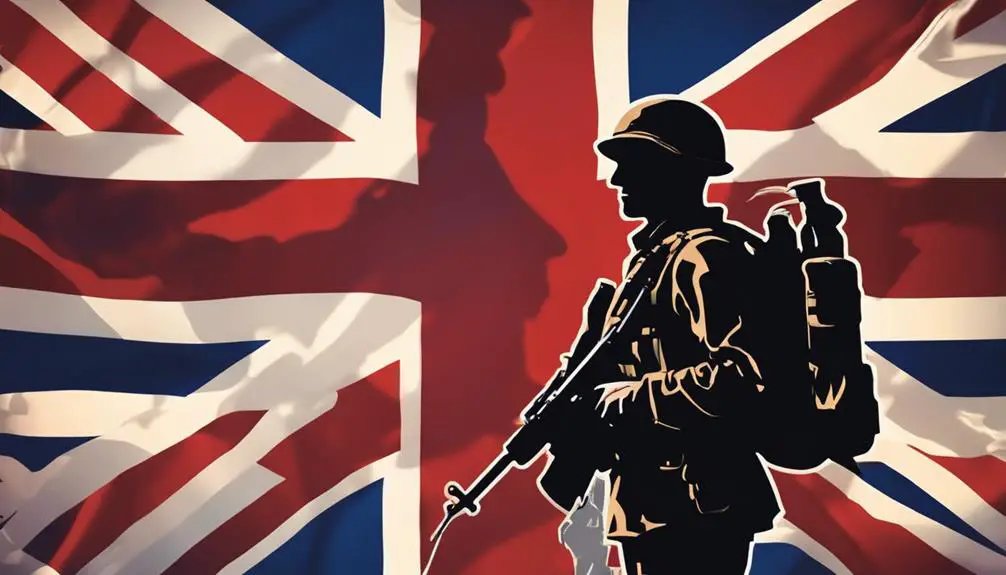You've heard the term 'gong' used to refer to a British military decoration, but did you know it's just one of many colloquialisms used to describe the array of medals and honors? The British military has a unique language when it comes to valor, with phrases like 'gong' and 'medal group' being part of the Honour Code governing the military. This language embodies camaraderie, pride, and shared experiences, infused with values of honor, loyalty, and courage. As you explore further, you'll uncover the fascinating world of British military decorations and the stories behind each ribbon and medal.
Highest Honors and Heroism

You're likely familiar with the Victoria Cross, the highest military decoration awarded for valor 'in the face of the enemy' to members of the British Armed Forces. Established in 1856, it's considered the pinnacle of bravery recognition. The Victoria Cross is reserved for acts of extraordinary courage, often involving extreme risk to one's own life. It's not surprising that only 1,357 Victoria Crosses have been awarded since its inception.
The Victoria Cross is often accompanied by other prestigious honors, such as the Distinguished Service Order (DSO) and the Distinguished Service Cross (DSC). These decorations acknowledge exceptional bravery and leadership in combat situations. While not as rare as the Victoria Cross, they still represent the highest standards of military conduct.
When you hear about a British servicemember receiving one of these honors, you can be certain they've demonstrated remarkable courage under fire. These decorations serve as a tribute to the bravery and selflessness of British military personnel, inspiring future generations to emulate their heroism.
Bravery in the Face
What constitutes bravery in the face of the enemy, and how do British military decorations distinguish between varying degrees of courage under fire? You may wonder how the British military honors its bravest soldiers. The answer lies in the subtle differences between its military decorations.
Here's a breakdown of the varying degrees of bravery recognized by the British military:
| Decoration | Description | Criteria |
|---|---|---|
| Victoria Cross | Highest honor for bravery | Extreme bravery in the face of the enemy |
| Conspicuous Gallantry Cross | Second-highest honor for bravery | Exceptional bravery under fire |
| Distinguished Service Cross | Third-highest honor for bravery | Gallantry during naval operations |
| Military Cross | Fourth-highest honor for bravery | Acts of gallantry during land battles |
| Courage Badge | Recognition for courage | Fearless charge or other acts of courage |
These decorations recognize soldiers who have demonstrated extraordinary bravery in the face of danger. From the Fearless Charge to the Courage Badge, each decoration acknowledges the varying degrees of courage exhibited by British soldiers. By understanding these distinctions, you'll gain a deeper appreciation for the bravery and sacrifices made by those who serve.
Medals for Merit Only

Beyond recognizing bravery in the face of the enemy, the British military also awards medals for outstanding merit and exceptional service, honoring soldiers who've demonstrated exceptional skill, dedication, and commitment to their duties.
As you explore the world of British military decorations, you'll find that merit badges play a significant role in acknowledging individual achievements. These badges are awarded as part of an extensive award system, acknowledging soldiers who've exceeded expectations in their duties.
You'll discover that the British military operates a thorough award system, comprising various medals and badges that recognize exceptional service, skill, and dedication. Merit badges, in particular, are reserved for soldiers who've shown exceptional proficiency in their respective fields. From marksmanship to medical expertise, these badges serve as a tangible recognition of a soldier's hard work and commitment.
As you navigate the world of British military decorations, you'll come to appreciate the significance of merit badges and the award systems that govern their distribution. By recognizing outstanding merit, the British military reinforces its values of excellence, dedication, and service, inspiring soldiers to excel.
The Language of Valor
In the British military, a unique lexicon of slang and colloquialisms has evolved to describe the various decorations and medals awarded for valor, with phrases like 'gong' and 'medal group' becoming an integral part of the language of valor. As you explore this world, you'll realize that Warrior Words, such as 'gong' and 'medal group', are more than just colloquialisms – they're a reflection of the Honour Code that governs the British military. This language of valor serves as a badge of honor, symbolizing bravery, sacrifice, and dedication to one's country.
You'll notice that the language of valor is infused with a sense of camaraderie and esprit de corps. Phrases like 'medal group' evoke a sense of pride and shared experience among those who've served. The Honour Code, which emphasizes honor, loyalty, and courage, is woven into the fabric of this language, reminding you that the British military is built on a foundation of trust, respect, and integrity.
As you explore the world of British military decorations, you'll come to appreciate the nuances of this unique language and the values it embodies.
Ribbons and Ranks Explained

You'll likely notice that the ribbons and medals you've earned or seen displayed are organized in a specific order, with each ribbon carefully positioned to reflect the wearer's rank and accomplishments. This meticulous arrangement isn't just for show; it's an essential part of Uniform Essentials.
The ribbons and medals are arranged in a specific order, with the most senior or highest-ranking awards displayed first. This order is determined by the wearer's Campaign History, with medals earned in combat or for valorous actions taking precedence. For instance, the Victoria Cross, the highest British military honor, is always displayed first.
As you examine the ribbons and medals, you'll notice that each one tells a story about the wearer's service, from the battles they've fought to the awards they've earned. By understanding the order and significance of these ribbons and medals, you'll gain a deeper appreciation for the wearer's experiences and achievements.
Unofficial Titles of Pride
Your familiarity with ribbons and medals leads you to another aspect of military culture: unofficial titles of pride, which British military personnel use to express camaraderie and shared experiences. These titles are often unique to specific regiments or units, reflecting their distinct identities and histories.
For instance, the Scots Guards are known as the 'Scots Greys,' while the Grenadier Guards are dubbed the 'Grenadiers.' These unofficial titles evoke a sense of Regimental Swagger, a pride in one's unit that's hard to match.
In combat, these titles can become a Battle Cry, a rallying call that inspires troops to fight with courage and determination. Unofficial titles can also serve as a badge of honor, signifying a soldier's membership in an elite group.
They're often used in informal settings, such as mess halls or barracks, where camaraderie and banter are essential to building unit cohesion. By embracing these unofficial titles, British military personnel reinforce their bonds and strengthen their esprit de corps.
Frequently Asked Questions
Can Civilians Wear Military Medals or Decorations?
When it comes to wearing military medals or decorations, you should know the rules. As a civilian, you shouldn't wear medals unless you've earned them. Medal etiquette dictates that only recipients or their families can wear them.
It's a Civilian honor to respect this tradition. Wearing someone else's medals can be seen as disrespectful, so it's best to avoid it. Instead, focus on earning your own recognition or supporting those who've served.
How Do You Clean and Maintain Military Medals Properly?
As you delicately hold your cherished military medals, you envision the stories they tell of bravery and sacrifice.
To preserve their luster, start by gently dusting them with a soft cloth.
For more thorough cleaning, use a mild soap solution and a soft-bristled toothbrush to remove dirt.
For medal polishing, opt for a gentle metal polish specifically designed for medals.
Don't forget to inspect and replace worn-out ribbons, a simple yet essential step in maintaining your medals' dignity.
Are Military Decorations Only Awarded to UK Citizens?
You're wondering if military decorations are only awarded to UK citizens. The answer is no, they're not exclusive to UK citizens.
While the UK honors its own citizens, other countries also award military decorations to their own citizens, as well as to foreigners who've demonstrated exceptional bravery or service.
It's a symbol of national pride, and citizen eligibility varies by country.
Can a Soldier's Medals Be Revoked or Taken Away?
You might wonder if a soldier's medals can be revoked or taken away. The answer is yes, it's possible.
Medal forfeiture or decoration revocation occurs when a service member's misconduct or dishonorable actions warrant the removal of their awards.
This can happen at any time, even after they've left the military.
The decision to revoke a medal is usually made by the awarding authority, and it's often a rare but serious consequence for unacceptable behavior.
Are There Any Specific Rules for Wearing Medals at Formal Events?
When attending formal events, you'll want to follow Medal Etiquette to make sure you're wearing your medals correctly. According to Formal Protocol, medals are typically worn on the left side of your chest, with the most senior award closest to your heart.
Make sure to space them evenly, with the top medal about 1 inch below your lapel. Remember to wear your medals in the correct order of precedence, and avoid overcrowding – you want to showcase your honors with pride!
Conclusion
As you don the medals, the weight of valor settles upon your chest, a tangible evidence to bravery in the face of fire.
The ribbons, a kaleidoscope of colors, whisper tales of sacrifice and honor.
In the language of valor, your story unfolds, a heroic tapestry woven with threads of courage and duty.
Your name etched on the medal, a beacon of pride, shining bright for all to see.







